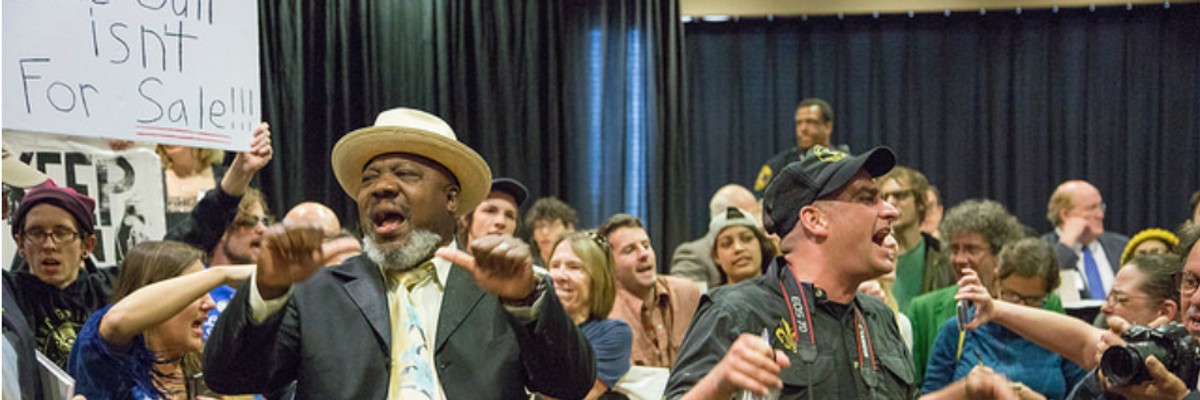Hundreds of protesters stormed inside the Superdome in New Orleans this week to disrupt a federal auction for Gulf of Mexico oil and gas leases. They waved signs, carried banners and chanted "Shut it down!" and "the Gulf is not for profit!"
The March 23 action at the Bureau of Ocean Energy Management (BOEM) event came the week after the Obama administration released a new five-year offshore drilling plan that canceled a proposed lease in the Atlantic but allowed leasing to continue in the Gulf of Mexico and Arctic. There are currently over 5,000 active federal oil and gas leases, most of them in the Gulf.
The protest drew about 200 people from across the Gulf region, with buses arriving from Texas, Mississippi, Alabama and Florida. The activists drew connections between drilling and the climate crisis, which is hitting Louisiana especially hard. One indigenous tribe in bayou country southwest of New Orleans is already relocating because of rising seas, and the state's residents live with the specter of destruction from Katrina and other hurricanes, which scientists say are worsened by global warming.
"We are going to the Superdome so that we never, ever again have to seek refuge there," the Louisiana Bucket Brigade, one of the event's organizers, said in a statement.
The protest was part of the group's "New Lease on Life" campaign, which is calling for an end to drilling in the Gulf and the immediate hiring of 1,000 workers to clean up and repair aging oil infrastructure, including rigs, platforms, pipelines and refineries.
Though it was difficult to hear over the protest, the auction proceeded as scheduled -- though perhaps not as the government had hoped. BOEM received 148 bids from 30 companies, with winning bids coming to just $156 million, the fourth-lowest total since 1983. Meanwhile, the government received no bids for a separate eastern Gulf also held Wednesday.
Oil is currently trading at under $40 a barrel, and the total number of rigs is at seven-year low.
This week's Superdome protest was part of the international Keep It in the Ground movement seeking to stop the extraction of fossil fuels and stave off devastating climate change. Elsewhere in the United States there have been protests at Bureau of Land Management lease auctions, including one in Utah where author and conservationist Terry Tempest Williams purchased parcels with the intention of not developing them.
The Gulf activists said their protest is particularly significant because of the region's historic submission to the industry. That ended with the 2010 BP Deepwater Horizon disaster.
"We are telling Big Oil to take their rigs and go home," said Bucket Brigade Executive Director Anne Rolfes. "And we are telling our elected officials to get with it, to lead the transition from dirty energy to one that relies on wind and solar."
